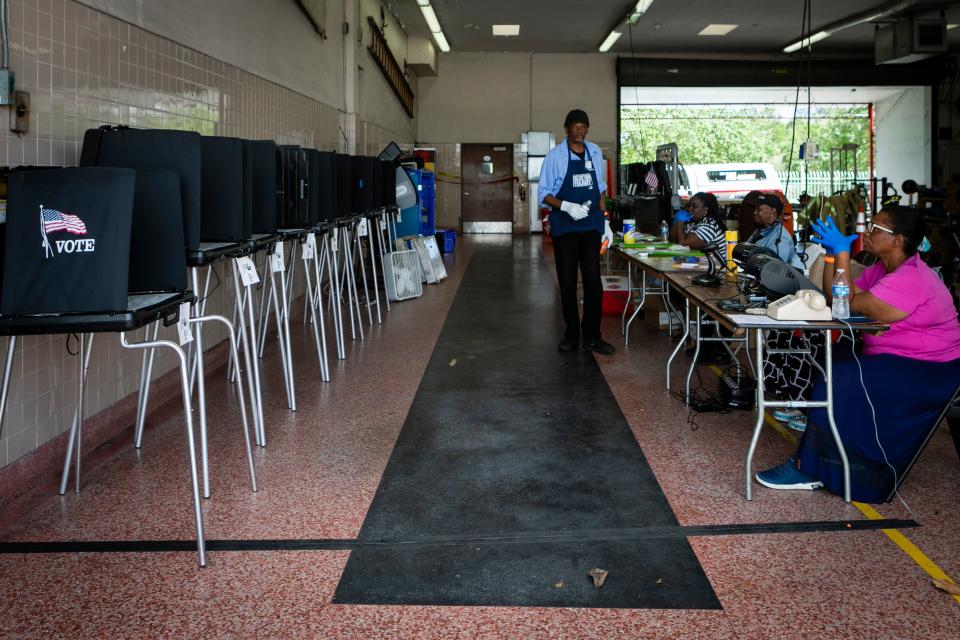Republicans block most aid to help states plan for presidential election amid coronavirus pandemic

WASHINGTON — Voting reforms that would make it much easier to cast ballots by mail in the fall presidential election were left out of the $2 trillion rescue package that was unveiled Wednesday, but key lawmakers vowed to keep pushing for a series of measures that would prepare the country for an election in the likely scenario that the coronavirus will still be a major presence in the country.
Sen. Amy Klobuchar, D-Minn., and Sen. Ron Wyden, D-Ore., said that while the $400 million included in the current package is “a step in the right direction,” it fell well short of what they and other Democrats had pushed for.
The money included for now will be available to states “to increase the ability to vote by mail, expand early voting and online registration and increase the safety of voting in-person by providing additional voting facilities and more poll workers,” one House Democratic staffer told Yahoo News.
But it’s a fraction of the $4 billion that House Democrats had pushed for. Those measures, along with the reforms in the “Natural Disaster and Emergency Ballot Act” proposed by Klobuchar and Wyden, would radically expand the ability of Americans to vote by mail in this fall’s elections, and would also expand early voting for up to two weeks prior to Election Day.
It’s still not clear where the country will be with the coronavirus pandemic in November, but one thing is certain: There won’t be a vaccine. Given that reality, these moves would be aimed at avoiding any kind of large gatherings at polling places this fall, to help prepare states for a nationwide election with outbreaks still happening.
“In times of crisis, the American people cannot be forced to choose between their health and exercising their right to vote,” Klobuchar and Wyden said in a statement. “We must enact election reforms across the country as well as secure more resources to guarantee safe and secure elections. We will continue to fight to pass the Natural Disaster and Emergency Ballot Act of 2020 to ensure every eligible American can safely and lawfully cast their ballot.”

On Monday, Wyden told reporters on a conference call that “it’s either going to be vote-by-mail or nothing if we have to deal with a worst-case scenario.”
Klobuchar announced Monday that her husband, John, had tested positive for the coronavirus.
Among Republicans who actually run elections at the state and local level, there is growing recognition of the need for such planning. A number of Republican elections officials signed a letter to Congress this past weekend calling on lawmakers to “include substantial funding in the coronavirus stimulus package so that we have the ability and resources to ensure that our voters can participate safely and with confidence in our elections.”
Senate Majority Leader Mitch McConnell, R-Ky., had proposed $140 million in the current package for elections, but state and local officials said this was “simply not enough.”
The idea of broadening access to voting by mail has yet to be embraced by Republican politicians in Washington. No GOP members of Congress have backed the reforms, and some hard-line Republicans have railed against the idea.
Conservative think tankers said universal mail voting would “make it easier to manipulate election outcomes and commit fraud.”
“The next president would be determined by ballots that have been marked behind closed doors by who knows who, perhaps collected and dropped in the mail (or not) by another who knows who, and then swiftly processed by the U.S. Postal Service, the same organization that routinely delivers us our neighbor’s mail,” wrote Hans von Spakovsky of the Heritage Foundation and J. Christian Adams of the Public Interest Legal Foundation.
Rep. Thomas Massie, R-Ky., tweeted that “universal vote by mail would be the end of our republic as we know it.”
The Brennan Center for Justice, a nonprofit advocacy group at New York University, has already warned that Congress is wasting precious time by not immediately deploying resources to plan for the fall.
“They need the money now,” Wendy Weiser, director of the Brennan Center’s Democracy Program, told the Washington Post. “If we wait a couple of months, it will be too late. They won’t be able to use it effectively or make the changes needed to avoid significant chaos on Election Day.”
The Brennan Center has released a detailed plan for how to safeguard the ability of all citizens to vote in the fall without fearing contagion of the coronavirus. Their proposal estimated a cost of at least $2 billion, and includes conservative cost estimates for each provision: between $54 and $89 million for printing mail-in ballots, $413 million to $593 million for prepaid postage, $82 million to $117 million for secure drop boxes and $120 million to $240 million for equipment to facilitate a massive influx of mail-in ballots.
“Implementing that plan,” the Brennan Center said, “must begin now.”
_____
Read more from Yahoo News:



